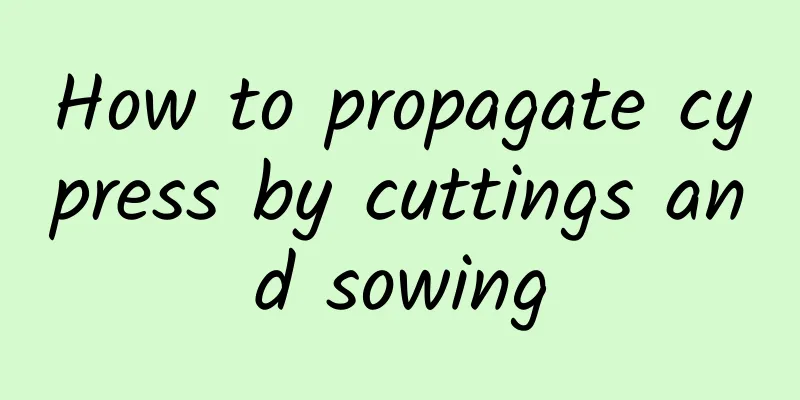How to plant potatoes How to plant potatoes to get high yields

|
Potatoes, also known as potatoes and sweet potatoes, are important food crops. They have high yields, are rich in nutrients, are easy to grow, and have a large market demand, which has attracted many large growers to plant them. The following is the time and method for planting potatoes. Potato planting timeThe potato planting time is generally from October to December, but the planting time is related to the local climate. Northeast China, Gansu and other northwestern regions plant in mid-to-late April to early May, and the spring planting time in central and southern provinces such as Jiangsu and Zhejiang is related to the local climate. Moreover, the planting time in Guangdong, Guangxi, Hainan, Yunnan and other places is from mid-to-late October to November. Potato Planting Technology and Management1. Variety selection Choose high-yield varieties that are suitable for local cultivation and have strong disease resistance. 2. Seed potato selection First, choose virus-free seed potatoes, and secondly, choose whole potatoes that are free of insects, disease spots, rot, and frostbite. 3. Cut into pieces Use a pointed knife to cut the potato lengthwise with the top bud as the center. There should be no more than 3 "eyes" on each slice of potato. Also, avoid choosing the eyes at the bottom as seed potatoes. 4. Germination The purpose of germination is to ensure full and strong emergence of seedlings after sowing, thereby increasing the yield of potatoes. The germination method is to place the cut potato slices in the sun on a sunny day to dry for 1-2 days until the buds can be seen. When germinating the potatoes, be careful not to soak them in water, otherwise the potatoes will rot. 5. Reasonable fertilization The base fertilizer is mainly farmyard manure, including 2000 kg of potassium fertilizer, 50 kg of potassium fertilizer, 50 kg of potassium sulfate compound fertilizer, and 50 kg of high-potassium compound fertilizer. Top dressing is mainly nitrogen fertilizer. After the buds appear in the soil after tillage, apply 30-40kg of nitrogen fertilizer per mu. 6. Planting seeds Furrow sowing is usually adopted, and the sowing depth is controlled at 6-8cm. After sowing, the soil is covered and pressed in time. 7. Scientific management For high-yield potato cultivation, first slow down the growth and then promote it. Before buds appear, control water to prevent the above-ground part from growing too tall. After buds appear, water and fertilize to promote the growth of the underground part. Ten days before harvest, control water to avoid rotten potatoes. 8. Cultivation and soil cultivation Tillage loosens and aerates the soil, which is beneficial to the growth of roots, the elongation of runners and the expansion of tubers. The first tillage is carried out after the seedlings are fully grown, with a depth of 8-10cm. The second tillage is carried out 10-15 days after the first tillage, and the third tillage is carried out when the crops are planted. 9. Disease prevention Common potato diseases include viral diseases and late blight. Diseases must be prevented and controlled as early as possible. If late blight-infected plants are found in the field, they must be removed in time and sprayed with mancozeb wettable powder to prevent field infection. Generally, the drug is applied once a week, and 3-4 consecutive uses are sufficient. 10. Insect prevention The main pests include ladybugs, white grubs, mole crickets, etc. They can be controlled by using pesticides or manual killing, or by using black light to control adult insects. 11. Harvest at the right time When the plant stops growing, most of the stems and leaves turn yellow, and the potato skin becomes hard, it is time to harvest. |
<<: Which one is easier to grow at home, Regent Begonia or Begonia sempervivum?
>>: Which one is better to keep at home, Guanghan Palace or Wanxia?
Recommend
What soil is suitable for planting lucky bamboo?
Introduction to Lucky Bamboo Lucky bamboo is very...
Ice grass planting method and season
Ice grass , also known as ice plant and ice-leaf ...
Advantages and disadvantages of Como roses
Como Rose is a rose pink, large-flowered miniatur...
How to take rose cuttings
During the process of rose propagation by cutting...
Cultivation methods and precautions of golden bud flower
The golden bract flower is also called the yellow...
What should I do if the leaves of Phalaenopsis turn yellow?
1. Too much light Reason: Light is very important...
The propagation and cultivation of Crinum chinense and the influence of environment
Propagation and cultivation of Crinum chinense Re...
How to make bayberry wine and the benefits of drinking it
1. How to do it 1. Preparation: Before making bay...
How to grow lucky grass
Watering When watering, water the plant as soon a...
What to do if there are white spots on the leaves of the fortune tree
1. Cut off diseased leaves If there are white spo...
The value of plane flowers
The ornamental value of the plane flower The orna...
Should orchids be watered thoroughly? How much water should be poured each time?
Is the orchid watered thoroughly? When watering o...
Can loquat trees be planted outside your home?
Can loquat trees be planted at the doorstep? Loqu...
Taboos for planting lemon trees in pots at home
1. Lighting Potted lemon trees prefer plenty of s...
What fertilizer is best for orchid flowers?
Fertilizing orchid flowers Orchid flowers like fe...









